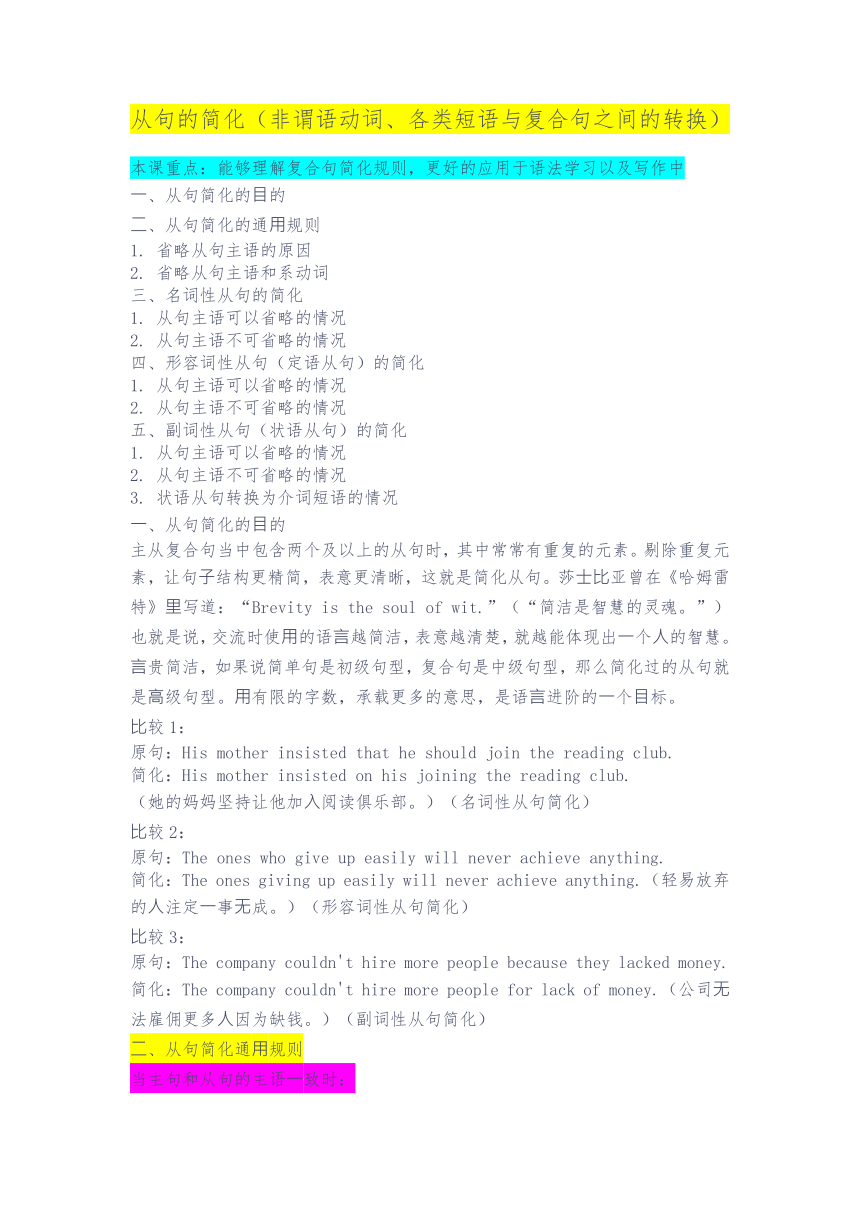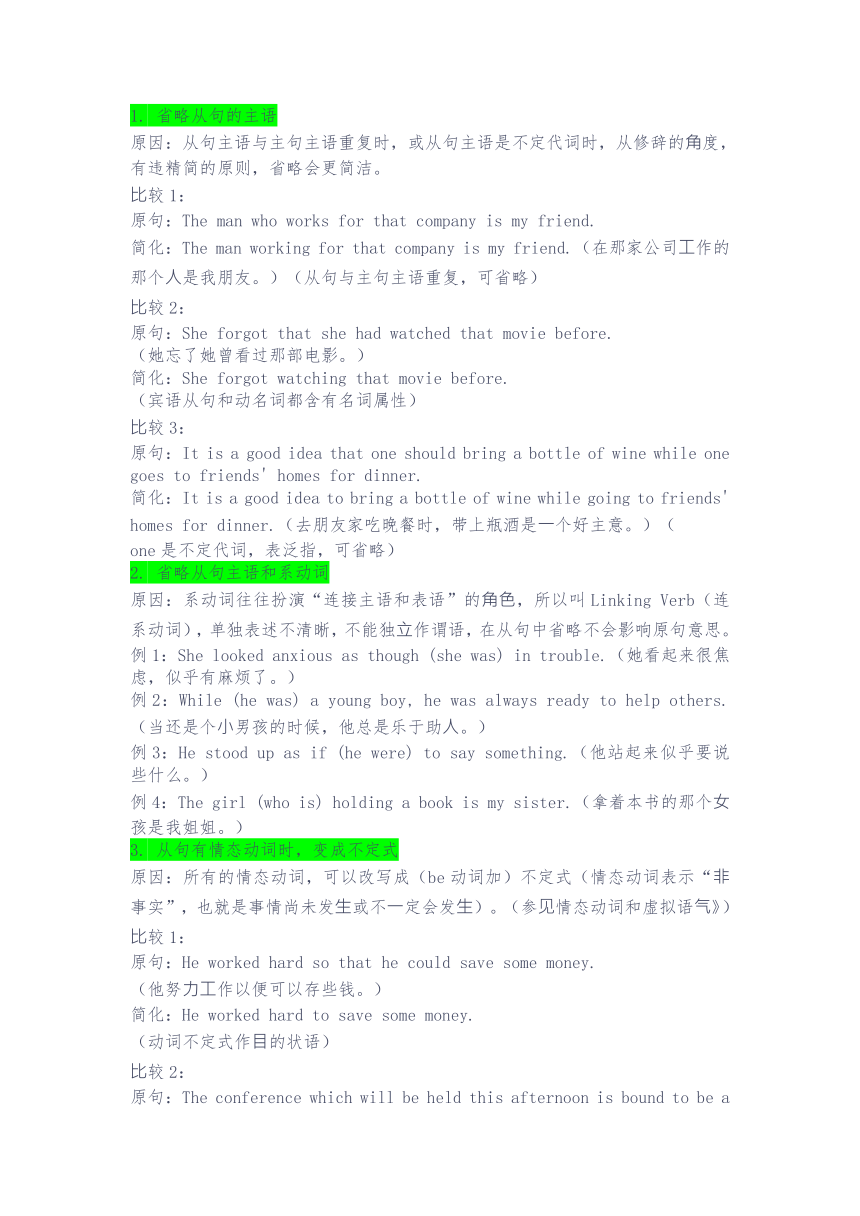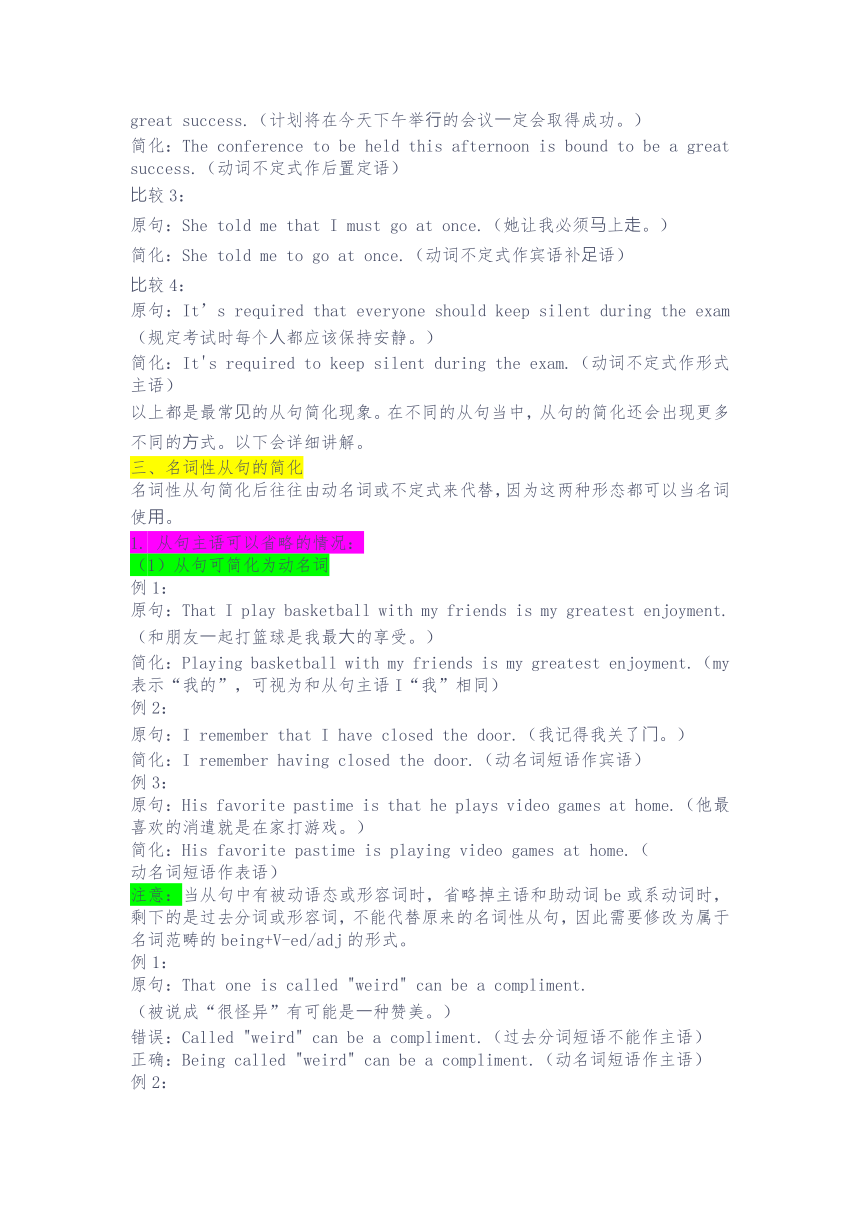2022届高考英语二轮复习:各类从句的简化—非谓语动词和各类短语与复合句之间的转换讲义
文档属性
| 名称 | 2022届高考英语二轮复习:各类从句的简化—非谓语动词和各类短语与复合句之间的转换讲义 |  | |
| 格式 | doc | ||
| 文件大小 | 62.0KB | ||
| 资源类型 | 教案 | ||
| 版本资源 | 通用版 | ||
| 科目 | 英语 | ||
| 更新时间 | 2021-10-05 10:10:02 | ||
图片预览



文档简介
从句的简化(非谓语动词、各类短语与复合句之间的转换)
本课重点:能够理解复合句简化规则,更好的应用于语法学习以及写作中
、从句简化的 的
、从句简化的通 规则
1.
省略从句主语的原因
2.
省略从句主语和系动词
三、名词性从句的简化
1.
从句主语可以省略的情况
2.
从句主语不可省略的情况
四、形容词性从句(定语从句)的简化
1.
从句主语可以省略的情况
2.
从句主语不可省略的情况
五、副词性从句(状语从句)的简化
1.
从句主语可以省略的情况
2.
从句主语不可省略的情况
3.
状语从句转换为介词短语的情况
、从句简化的 的
主从复合句当中包含两个及以上的从句时,其中常常有重复的元素。剔除重复元素,让句 结构更精简,表意更清晰,这就是简化从句。莎 亚曾在《哈姆雷特》 写道:“Brevity
is
the
soul
of
wit.”(“简洁是智慧的灵魂。”)也就是说,交流时使 的语 越简洁,表意越清楚,就越能体现出 个 的智慧。 贵简洁,如果说简单句是初级句型,复合句是中级句型,那么简化过的从句就是 级句型。 有限的字数,承载更多的意思,是语 进阶的 个 标。
较1:
原句:His
mother
insisted
that
he
should
join
the
reading
club.
简化:His
mother
insisted
on
his
joining
the
reading
club.
(她的妈妈坚持让他加 阅读俱乐部。)(名词性从句简化)
较2:
原句:The
ones
who
give
up
easily
will
never
achieve
anything.
简化:The
ones
giving
up
easily
will
never
achieve
anything.(轻易放弃的 注定 事 成。)(形容词性从句简化)
较3:
原句:The
company
couldn't
hire
more
people
because
they
lacked
money.
简化:The
company
couldn't
hire
more
people
for
lack
of
money.(公司 法雇佣更多 因为缺钱。)(副词性从句简化)
、从句简化通 规则
当主句和从句的主语 致时:
1.
省略从句的主语
原因:从句主语与主句主语重复时,或从句主语是不定代词时,从修辞的 度,有违精简的原则,省略会更简洁。
较1:
原句:The
man
who
works
for
that
company
is
my
friend.
简化:The
man
working
for
that
company
is
my
friend.(在那家公司 作的那个 是我朋友。)(从句与主句主语重复,可省略)
较2:
原句:She
forgot
that
she
had
watched
that
movie
before.
(她忘了她曾看过那部电影。)
简化:She
forgot
watching
that
movie
before.
(宾语从句和动名词都含有名词属性)
较3:
原句:It
is
a
good
idea
that
one
should
bring
a
bottle
of
wine
while
one
goes
to
friends'
homes
for
dinner.
简化:It
is
a
good
idea
to
bring
a
bottle
of
wine
while
going
to
friends'
homes
for
dinner.(去朋友家吃晚餐时,带上瓶酒是 个好主意。)(
one是不定代词,表泛指,可省略)
2.
省略从句主语和系动词
原因:系动词往往扮演“连接主语和表语”的 ,所以叫Linking
Verb(连系动词),单独表述不清晰,不能独 作谓语,在从句中省略不会影响原句意思。
例1:She
looked
anxious
as
though
(she
was)
in
trouble.(她看起来很焦虑,似乎有麻烦了。)
例2:While
(he
was)
a
young
boy,
he
was
always
ready
to
help
others.(当还是个 男孩的时候,他总是乐于助 。)
例3:He
stood
up
as
if
(he
were)
to
say
something.(他站起来似乎要说些什么。)
例4:The
girl
(who
is)
holding
a
book
is
my
sister.(拿着本书的那个 孩是我姐姐。)
3.
从句有情态动词时,变成不定式
原因:所有的情态动词,可以改写成(be动词加)不定式(情态动词表示“ 事实”,也就是事情尚未发 或不 定会发 )。(参 情态动词和虚拟语 》)
较1:
原句:He
worked
hard
so
that
he
could
save
some
money.
(他努 作以便可以存些钱。)
简化:He
worked
hard
to
save
some
money.
(动词不定式作 的状语)
较2:
原句:The
conference
which
will
be
held
this
afternoon
is
bound
to
be
a
great
success.(计划将在今天下午举 的会议 定会取得成功。)
简化:The
conference
to
be
held
this
afternoon
is
bound
to
be
a
great
success.(动词不定式作后置定语)
较3:
原句:She
told
me
that
I
must
go
at
once.(她让我必须 上 。)
简化:She
told
me
to
go
at
once.(动词不定式作宾语补 语)
较4:
原句:It’s
required
that
everyone
should
keep
silent
during
the
exam(规定考试时每个 都应该保持安静。)
简化:It's
required
to
keep
silent
during
the
exam.(动词不定式作形式主语)
以上都是最常 的从句简化现象。在不同的从句当中,从句的简化还会出现更多不同的 式。以下会详细讲解。
三、名词性从句的简化
名词性从句简化后往往由动名词或不定式来代替,因为这两种形态都可以当名词使 。
1.
从句主语可以省略的情况:
(1)从句可简化为动名词
例1:
原句:That
I
play
basketball
with
my
friends
is
my
greatest
enjoyment.(和朋友 起打篮球是我最 的享受。)
简化:Playing
basketball
with
my
friends
is
my
greatest
enjoyment.(my表示“我的”,可视为和从句主语I“我”相同)
例2:
原句:I
remember
that
I
have
closed
the
door.(我记得我关了 。)
简化:I
remember
having
closed
the
door.(动名词短语作宾语)
例3:
原句:His
favorite
pastime
is
that
he
plays
video
games
at
home.(他最喜欢的消遣就是在家打游戏。)
简化:His
favorite
pastime
is
playing
video
games
at
home.(
动名词短语作表语)
注意:当从句中有被动语态或形容词时,省略掉主语和助动词be或系动词时,剩下的是过去分词或形容词,不能代替原来的名词性从句,因此需要修改为属于名词范畴的being+V-ed/adj的形式。
例1:
原句:That
one
is
called
"weird"
can
be
a
compliment.
(被说成“很怪异”有可能是 种赞美。)
错误:Called
"weird"
can
be
a
compliment.(过去分词短语不能作主语)
正确:Being
called
"weird"
can
be
a
compliment.(动名词短语作主语)
例2:
原句:That
you
are
busy
should
not
be
the
excuse
for
making
mistakes.(你很忙不应该成为犯错的借 。)
错误:Busy
should
not
be
an
excuse
for
making
mistakes.
(形容词不能作主语)
正确:Your
being
busy
should
not
be
an
excuse
for
making
mistakes.
(形容词性物主代词+动名词短语)
(2)从句可简化为不定式
例1:
原句:I
hope
that
I
can
catch
up
with
you.(我希望可以赶上你。)
简化:I
hope
to
catch
up
with
you.(动词不定式作宾语)
例2:
原句:That
one
should
wear
black
at
funerals
is
common
knowledge.
(葬礼上穿 服是常理。)
简化:To
wear
black
at
funerals
is
common
knowledge.(动词不定式作主语)
例3:
原句:The
idea
is
that
one
should
stick
to
the
goal.(重点是应该坚定 标。)
简化:The
idea
is
to
stick
to
the
goal.(动词不定式作表语)
例4:
原句:She
doesn't
know
how
she
should
react.(她不知道她应该如何反应。)
简化:She
doesn't
know
how
to
react.(动词不定式作宾语)
2.
从句主语不能省略的情况:
从句主语和主句主语不 致,如果主语省略,就会表意不清。可 别的 法简化句 :
(1)宾语从句可改成“主+谓+宾+宾补”句型
原句:I
found
that
the
exam
was
extremely
difficult.(我觉得这个考试超难。)
错误:I
found
extremely
difficult.
正确:I
found
the
exam
(to
be)
extremely
difficult.
(2) 所有格来表示从句的逻辑主语
例1:
原句:I
can't
stand
that
he
texts
my
girlfriend
every
day.(我受不了他每天给我 友发短信。)
错误:I
can't
stand
texting
my
girlfriend
every
day.
正确:I
can't
stand
his
texting
my
girlfriend
every
day.
(his+动名词短语=名词短语)
例2:
原句:That
he
shows
up
on
time
is
my
biggest
wish.
(他准时出现是我最 的愿望。)
错误:Showing
up
on
time
is
my
biggest
wish.
正确:His
showing
up
on
time
is
my
biggest
wish.
(his+动名词短语=名词短语)
(3)加介词引出名词结构
原句:I'm
worried
that
my
child
hangs
out
with
the
wrong
crowd.(我担 我的 孩跟不好的 混在 起。)
简化:I'm
worried
about
my
child's
hanging
out
with
the
wrong
crowd.(about+动名词短语=介宾短语)
四、形容词性从句(定语从句)的简化
1.
从句主语可以被省略的情况:
(1)定语从句中的主动语态,可简化为现在分词形式:
例1:
原句:Police
are
attempting
to
stop
the
man
who
is
riding
a
horse.(警察们正在尝试着要去阻拦下 个骑 的 。)
简化:Police
are
attempting
to
stop
the
man
riding
a
horse.
(现在分词短语作后置定语)
例2:
原句:I
changed
my
laptop
which
collapses
every
now
and
then.
(我把我那时不时就崩溃的电脑换掉了。)
简化:I
changed
my
laptop
collapsing
every
now
and
then.
(现在分词短语作后置定语)
(2)定语从句当中的被动语态,可以简化成过去分词的形式:
原句:The
bridge,
which
was
built
50
years
ago,
collapsed
in
the
last
storm.(50年前建的那座桥在上次暴 当中坍塌了。)
简化:The
bridge
built
50
years
ago
collapsed
in
the
last
storm.
(过去分词短语作后置定语)
(3)如果定语从句中的情态动词,可简化成不定式:
原句:She
is
the
one
who
will
go
on
a
business
trip.
(她就是要出差的那个 。)
简化:She
is
the
one
to
go
on
a
business
trip.
(动词不定式作后置定语)
(4) 限定性定语从句中的be动词加形容词,可简化为形容词,做插 语:
原句:The
girl,
who
is
slim
and
smart,
is
my
girlfriend.
(那个 瘦 聪明的 孩是我 朋友。)
简化:The
girl,
slim
and
smart,
is
my
girlfriend.
(5) 限定性定语从句的be动词加名词,可简化为名词,作同位语:
原句:Mr.
Smith,
who
is
our
new
teacher,
is
very
kind
to
us.
(史密斯先 是我们的新教师,对我们很好。)
简化:Mr.
Smith,
our
new
teacher,
is
very
kind
to
us.
2.
从句主语不可省略的情况:
从句主语和主句主语不 致,如果主语省略,就会表意不清。可 “介词+原从句主语”来作不定式的逻辑主语。
原句:I
have
hundreds
of
books
that
you
can
borrow.
(我有很多书你可以借阅。)
错误:I
have
hundreds
of
books
to
borrow.
(不是I发出borrow的动作)
简化:I
have
hundreds
of
books
for
you
to
borrow.
五、副词性从句(状语从句)的简化
1.
从句主语可以省略的情况:
(1)状语从句中的被动语态,可简化为过去分词形式:
原句:As
it
was
weakened
by
the
storm,
the
bridge
was
no
longer
safe.(因为受到暴 侵袭,这座桥不再安全。)
简化:Weakened
by
the
storm,
the
bridge
was
no
longer
safe.
(过去分词短语作原因状语)
(2)状语从句中的进 式,可简化为现在分词的形式。从属连词在不影响句意的情况下,可以省略:
原句:While
he
was
walking
down
the
street,
he
bumped
into
his
old
friend.(当他在街上 的时候,他撞 了他的 朋友。)
简化:(While)
walking
down
the
street,
he
bumped
into
his
old
friend.(while删掉不影响句意)
注意:如果省略从属连词影响句意,则不能省略,或 其他内容补充表达。
原句:Although
he
was
trying
to
keep
his
voice
down,
he
couldn't
avoid
being
heard.(就算他尝试着压低声 ,他也不能避免被 听到。)
简化:Although
trying
to
keep
his
voice
down,
he
couldn't
avoid
being
heard.(如果去掉although,表达不出让步)
或:Trying
to
keep
his
voice
down,
he
still
couldn't
avoid
being
heard.(去掉although,句 加still表达让步)
(3)状语从句表 的或结果,可简化成不定式短语:
原句:I
learn
English,
so
that
I
can
communicate
with
foreigners.(我学英语,以便/所以我可以和外国 交流。)
简化:I
learn
English
to
communicate
with
foreigners.
(动词不定式作 的/结果状语)
(4)状语从句中有be动词加形容词,可简化为形容词(短语):
原句:As
he
was
sure
that
he
would
win,
he
didn't
feel
nervous
at
all.(因为他肯定 会赢,所以他 点 都不紧张。)
简化:Sure
that
he
would
win,
he
didn't
feel
nervous
at
all.
(形容词短语作原因状语)
2.
从句主语不可省略的情况:
状语从句中,如从句主语和主句主语不同,则可:
①从句改写成独 主格结构
(参 谓语动词》);
②换句 主语。如果忽略这 点,则会产 歧义。
例1:Worried
about
being
late,
a
taxi
seemed
like
a
good
idea.
问题:谁担 迟到?是出租 吗?
修改1:The
girl
worried
about
being
late,
a
taxi
seemed
like
a
good
idea.( 孩很担 迟到,打出租 似乎是个好主意。)(独 主格)
修改2:Worried
about
being
late,
the
girl
got
a
taxi.
(担 迟到, 孩打了个 。)(换主语)
例2:To
recover
from
the
surgery,
the
doctor
recommended
bed
rest.
问题:谁需要从 术中恢复?是医 吗?
修改1:The
patient
to
recover
from
the
surgery,
the
doctor
recommended
bed
rest.(病 要从 术中恢复,医 建议卧床休息。)(独 主格)
修改2:To
recover
from
the
surgery,
the
patient
was
recommended
bed
rest
by
the
doctor.(为了
从 术中恢复,医 建议病 卧床休息。)(换主语)
3.
状语从句转换为介词短语的情况:
例1:
原句:If
it
hadn't
been
you,
I
wouldn't
be
here
today.
(如果没有你,我今天也不会在这 。)
简化:Without
you,
I
wouldn't
be
here
today.
(介词短语作条件状语)
例2:
原句:Don’t
do
anything
until
you
get
further
notice.
(在得到进 步通知前,别做任何事情。)
简化:Don't
do
anything
until
further
notice.(介词短语作时间状语)
例3:
原句:When
he
arrived
there,
he
found
no
one
in
the
room.(当他到那 的时候,他发现屋 没有 个 。)
简化:Upon
arriving
there,
he
found
no
one
in
the
room./Upon
his
arrival,
he
found
no
one
in
the
room.(介词短语作时间状语)
例4:
原句:Although
she
opposed
it,
he
went
out.(尽管她反对,他还是出去了。)
简化:Despite/In
spite
of
her
opposition,
he
went
out.
(介词短语作让步状语)
本课重点:能够理解复合句简化规则,更好的应用于语法学习以及写作中
、从句简化的 的
、从句简化的通 规则
1.
省略从句主语的原因
2.
省略从句主语和系动词
三、名词性从句的简化
1.
从句主语可以省略的情况
2.
从句主语不可省略的情况
四、形容词性从句(定语从句)的简化
1.
从句主语可以省略的情况
2.
从句主语不可省略的情况
五、副词性从句(状语从句)的简化
1.
从句主语可以省略的情况
2.
从句主语不可省略的情况
3.
状语从句转换为介词短语的情况
、从句简化的 的
主从复合句当中包含两个及以上的从句时,其中常常有重复的元素。剔除重复元素,让句 结构更精简,表意更清晰,这就是简化从句。莎 亚曾在《哈姆雷特》 写道:“Brevity
is
the
soul
of
wit.”(“简洁是智慧的灵魂。”)也就是说,交流时使 的语 越简洁,表意越清楚,就越能体现出 个 的智慧。 贵简洁,如果说简单句是初级句型,复合句是中级句型,那么简化过的从句就是 级句型。 有限的字数,承载更多的意思,是语 进阶的 个 标。
较1:
原句:His
mother
insisted
that
he
should
join
the
reading
club.
简化:His
mother
insisted
on
his
joining
the
reading
club.
(她的妈妈坚持让他加 阅读俱乐部。)(名词性从句简化)
较2:
原句:The
ones
who
give
up
easily
will
never
achieve
anything.
简化:The
ones
giving
up
easily
will
never
achieve
anything.(轻易放弃的 注定 事 成。)(形容词性从句简化)
较3:
原句:The
company
couldn't
hire
more
people
because
they
lacked
money.
简化:The
company
couldn't
hire
more
people
for
lack
of
money.(公司 法雇佣更多 因为缺钱。)(副词性从句简化)
、从句简化通 规则
当主句和从句的主语 致时:
1.
省略从句的主语
原因:从句主语与主句主语重复时,或从句主语是不定代词时,从修辞的 度,有违精简的原则,省略会更简洁。
较1:
原句:The
man
who
works
for
that
company
is
my
friend.
简化:The
man
working
for
that
company
is
my
friend.(在那家公司 作的那个 是我朋友。)(从句与主句主语重复,可省略)
较2:
原句:She
forgot
that
she
had
watched
that
movie
before.
(她忘了她曾看过那部电影。)
简化:She
forgot
watching
that
movie
before.
(宾语从句和动名词都含有名词属性)
较3:
原句:It
is
a
good
idea
that
one
should
bring
a
bottle
of
wine
while
one
goes
to
friends'
homes
for
dinner.
简化:It
is
a
good
idea
to
bring
a
bottle
of
wine
while
going
to
friends'
homes
for
dinner.(去朋友家吃晚餐时,带上瓶酒是 个好主意。)(
one是不定代词,表泛指,可省略)
2.
省略从句主语和系动词
原因:系动词往往扮演“连接主语和表语”的 ,所以叫Linking
Verb(连系动词),单独表述不清晰,不能独 作谓语,在从句中省略不会影响原句意思。
例1:She
looked
anxious
as
though
(she
was)
in
trouble.(她看起来很焦虑,似乎有麻烦了。)
例2:While
(he
was)
a
young
boy,
he
was
always
ready
to
help
others.(当还是个 男孩的时候,他总是乐于助 。)
例3:He
stood
up
as
if
(he
were)
to
say
something.(他站起来似乎要说些什么。)
例4:The
girl
(who
is)
holding
a
book
is
my
sister.(拿着本书的那个 孩是我姐姐。)
3.
从句有情态动词时,变成不定式
原因:所有的情态动词,可以改写成(be动词加)不定式(情态动词表示“ 事实”,也就是事情尚未发 或不 定会发 )。(参 情态动词和虚拟语 》)
较1:
原句:He
worked
hard
so
that
he
could
save
some
money.
(他努 作以便可以存些钱。)
简化:He
worked
hard
to
save
some
money.
(动词不定式作 的状语)
较2:
原句:The
conference
which
will
be
held
this
afternoon
is
bound
to
be
a
great
success.(计划将在今天下午举 的会议 定会取得成功。)
简化:The
conference
to
be
held
this
afternoon
is
bound
to
be
a
great
success.(动词不定式作后置定语)
较3:
原句:She
told
me
that
I
must
go
at
once.(她让我必须 上 。)
简化:She
told
me
to
go
at
once.(动词不定式作宾语补 语)
较4:
原句:It’s
required
that
everyone
should
keep
silent
during
the
exam(规定考试时每个 都应该保持安静。)
简化:It's
required
to
keep
silent
during
the
exam.(动词不定式作形式主语)
以上都是最常 的从句简化现象。在不同的从句当中,从句的简化还会出现更多不同的 式。以下会详细讲解。
三、名词性从句的简化
名词性从句简化后往往由动名词或不定式来代替,因为这两种形态都可以当名词使 。
1.
从句主语可以省略的情况:
(1)从句可简化为动名词
例1:
原句:That
I
play
basketball
with
my
friends
is
my
greatest
enjoyment.(和朋友 起打篮球是我最 的享受。)
简化:Playing
basketball
with
my
friends
is
my
greatest
enjoyment.(my表示“我的”,可视为和从句主语I“我”相同)
例2:
原句:I
remember
that
I
have
closed
the
door.(我记得我关了 。)
简化:I
remember
having
closed
the
door.(动名词短语作宾语)
例3:
原句:His
favorite
pastime
is
that
he
plays
video
games
at
home.(他最喜欢的消遣就是在家打游戏。)
简化:His
favorite
pastime
is
playing
video
games
at
home.(
动名词短语作表语)
注意:当从句中有被动语态或形容词时,省略掉主语和助动词be或系动词时,剩下的是过去分词或形容词,不能代替原来的名词性从句,因此需要修改为属于名词范畴的being+V-ed/adj的形式。
例1:
原句:That
one
is
called
"weird"
can
be
a
compliment.
(被说成“很怪异”有可能是 种赞美。)
错误:Called
"weird"
can
be
a
compliment.(过去分词短语不能作主语)
正确:Being
called
"weird"
can
be
a
compliment.(动名词短语作主语)
例2:
原句:That
you
are
busy
should
not
be
the
excuse
for
making
mistakes.(你很忙不应该成为犯错的借 。)
错误:Busy
should
not
be
an
excuse
for
making
mistakes.
(形容词不能作主语)
正确:Your
being
busy
should
not
be
an
excuse
for
making
mistakes.
(形容词性物主代词+动名词短语)
(2)从句可简化为不定式
例1:
原句:I
hope
that
I
can
catch
up
with
you.(我希望可以赶上你。)
简化:I
hope
to
catch
up
with
you.(动词不定式作宾语)
例2:
原句:That
one
should
wear
black
at
funerals
is
common
knowledge.
(葬礼上穿 服是常理。)
简化:To
wear
black
at
funerals
is
common
knowledge.(动词不定式作主语)
例3:
原句:The
idea
is
that
one
should
stick
to
the
goal.(重点是应该坚定 标。)
简化:The
idea
is
to
stick
to
the
goal.(动词不定式作表语)
例4:
原句:She
doesn't
know
how
she
should
react.(她不知道她应该如何反应。)
简化:She
doesn't
know
how
to
react.(动词不定式作宾语)
2.
从句主语不能省略的情况:
从句主语和主句主语不 致,如果主语省略,就会表意不清。可 别的 法简化句 :
(1)宾语从句可改成“主+谓+宾+宾补”句型
原句:I
found
that
the
exam
was
extremely
difficult.(我觉得这个考试超难。)
错误:I
found
extremely
difficult.
正确:I
found
the
exam
(to
be)
extremely
difficult.
(2) 所有格来表示从句的逻辑主语
例1:
原句:I
can't
stand
that
he
texts
my
girlfriend
every
day.(我受不了他每天给我 友发短信。)
错误:I
can't
stand
texting
my
girlfriend
every
day.
正确:I
can't
stand
his
texting
my
girlfriend
every
day.
(his+动名词短语=名词短语)
例2:
原句:That
he
shows
up
on
time
is
my
biggest
wish.
(他准时出现是我最 的愿望。)
错误:Showing
up
on
time
is
my
biggest
wish.
正确:His
showing
up
on
time
is
my
biggest
wish.
(his+动名词短语=名词短语)
(3)加介词引出名词结构
原句:I'm
worried
that
my
child
hangs
out
with
the
wrong
crowd.(我担 我的 孩跟不好的 混在 起。)
简化:I'm
worried
about
my
child's
hanging
out
with
the
wrong
crowd.(about+动名词短语=介宾短语)
四、形容词性从句(定语从句)的简化
1.
从句主语可以被省略的情况:
(1)定语从句中的主动语态,可简化为现在分词形式:
例1:
原句:Police
are
attempting
to
stop
the
man
who
is
riding
a
horse.(警察们正在尝试着要去阻拦下 个骑 的 。)
简化:Police
are
attempting
to
stop
the
man
riding
a
horse.
(现在分词短语作后置定语)
例2:
原句:I
changed
my
laptop
which
collapses
every
now
and
then.
(我把我那时不时就崩溃的电脑换掉了。)
简化:I
changed
my
laptop
collapsing
every
now
and
then.
(现在分词短语作后置定语)
(2)定语从句当中的被动语态,可以简化成过去分词的形式:
原句:The
bridge,
which
was
built
50
years
ago,
collapsed
in
the
last
storm.(50年前建的那座桥在上次暴 当中坍塌了。)
简化:The
bridge
built
50
years
ago
collapsed
in
the
last
storm.
(过去分词短语作后置定语)
(3)如果定语从句中的情态动词,可简化成不定式:
原句:She
is
the
one
who
will
go
on
a
business
trip.
(她就是要出差的那个 。)
简化:She
is
the
one
to
go
on
a
business
trip.
(动词不定式作后置定语)
(4) 限定性定语从句中的be动词加形容词,可简化为形容词,做插 语:
原句:The
girl,
who
is
slim
and
smart,
is
my
girlfriend.
(那个 瘦 聪明的 孩是我 朋友。)
简化:The
girl,
slim
and
smart,
is
my
girlfriend.
(5) 限定性定语从句的be动词加名词,可简化为名词,作同位语:
原句:Mr.
Smith,
who
is
our
new
teacher,
is
very
kind
to
us.
(史密斯先 是我们的新教师,对我们很好。)
简化:Mr.
Smith,
our
new
teacher,
is
very
kind
to
us.
2.
从句主语不可省略的情况:
从句主语和主句主语不 致,如果主语省略,就会表意不清。可 “介词+原从句主语”来作不定式的逻辑主语。
原句:I
have
hundreds
of
books
that
you
can
borrow.
(我有很多书你可以借阅。)
错误:I
have
hundreds
of
books
to
borrow.
(不是I发出borrow的动作)
简化:I
have
hundreds
of
books
for
you
to
borrow.
五、副词性从句(状语从句)的简化
1.
从句主语可以省略的情况:
(1)状语从句中的被动语态,可简化为过去分词形式:
原句:As
it
was
weakened
by
the
storm,
the
bridge
was
no
longer
safe.(因为受到暴 侵袭,这座桥不再安全。)
简化:Weakened
by
the
storm,
the
bridge
was
no
longer
safe.
(过去分词短语作原因状语)
(2)状语从句中的进 式,可简化为现在分词的形式。从属连词在不影响句意的情况下,可以省略:
原句:While
he
was
walking
down
the
street,
he
bumped
into
his
old
friend.(当他在街上 的时候,他撞 了他的 朋友。)
简化:(While)
walking
down
the
street,
he
bumped
into
his
old
friend.(while删掉不影响句意)
注意:如果省略从属连词影响句意,则不能省略,或 其他内容补充表达。
原句:Although
he
was
trying
to
keep
his
voice
down,
he
couldn't
avoid
being
heard.(就算他尝试着压低声 ,他也不能避免被 听到。)
简化:Although
trying
to
keep
his
voice
down,
he
couldn't
avoid
being
heard.(如果去掉although,表达不出让步)
或:Trying
to
keep
his
voice
down,
he
still
couldn't
avoid
being
heard.(去掉although,句 加still表达让步)
(3)状语从句表 的或结果,可简化成不定式短语:
原句:I
learn
English,
so
that
I
can
communicate
with
foreigners.(我学英语,以便/所以我可以和外国 交流。)
简化:I
learn
English
to
communicate
with
foreigners.
(动词不定式作 的/结果状语)
(4)状语从句中有be动词加形容词,可简化为形容词(短语):
原句:As
he
was
sure
that
he
would
win,
he
didn't
feel
nervous
at
all.(因为他肯定 会赢,所以他 点 都不紧张。)
简化:Sure
that
he
would
win,
he
didn't
feel
nervous
at
all.
(形容词短语作原因状语)
2.
从句主语不可省略的情况:
状语从句中,如从句主语和主句主语不同,则可:
①从句改写成独 主格结构
(参 谓语动词》);
②换句 主语。如果忽略这 点,则会产 歧义。
例1:Worried
about
being
late,
a
taxi
seemed
like
a
good
idea.
问题:谁担 迟到?是出租 吗?
修改1:The
girl
worried
about
being
late,
a
taxi
seemed
like
a
good
idea.( 孩很担 迟到,打出租 似乎是个好主意。)(独 主格)
修改2:Worried
about
being
late,
the
girl
got
a
taxi.
(担 迟到, 孩打了个 。)(换主语)
例2:To
recover
from
the
surgery,
the
doctor
recommended
bed
rest.
问题:谁需要从 术中恢复?是医 吗?
修改1:The
patient
to
recover
from
the
surgery,
the
doctor
recommended
bed
rest.(病 要从 术中恢复,医 建议卧床休息。)(独 主格)
修改2:To
recover
from
the
surgery,
the
patient
was
recommended
bed
rest
by
the
doctor.(为了
从 术中恢复,医 建议病 卧床休息。)(换主语)
3.
状语从句转换为介词短语的情况:
例1:
原句:If
it
hadn't
been
you,
I
wouldn't
be
here
today.
(如果没有你,我今天也不会在这 。)
简化:Without
you,
I
wouldn't
be
here
today.
(介词短语作条件状语)
例2:
原句:Don’t
do
anything
until
you
get
further
notice.
(在得到进 步通知前,别做任何事情。)
简化:Don't
do
anything
until
further
notice.(介词短语作时间状语)
例3:
原句:When
he
arrived
there,
he
found
no
one
in
the
room.(当他到那 的时候,他发现屋 没有 个 。)
简化:Upon
arriving
there,
he
found
no
one
in
the
room./Upon
his
arrival,
he
found
no
one
in
the
room.(介词短语作时间状语)
例4:
原句:Although
she
opposed
it,
he
went
out.(尽管她反对,他还是出去了。)
简化:Despite/In
spite
of
her
opposition,
he
went
out.
(介词短语作让步状语)
